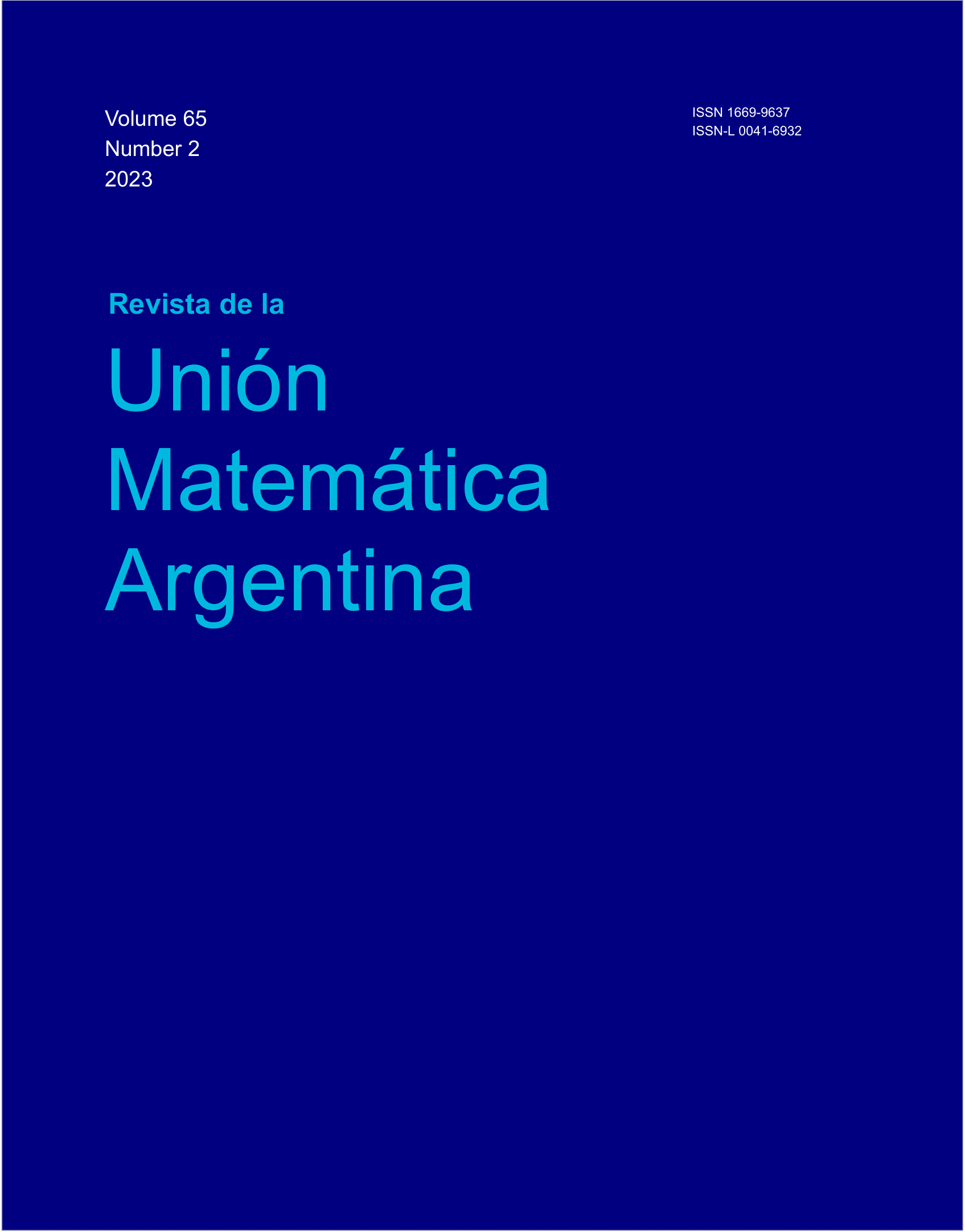Brownian motion on involutive braided spaces
DOI:
https://doi.org/10.33044/revuma.2574Abstract
We study (quantum) stochastic processes with independent and stationary increments (i.e., Lévy processes), and in particular Brownian motions in braided monoidal categories. The notion of increments is based on a bialgebra or Hopf algebra structure, and positivity is taken w.r.t. an involution. We show that involutive bialgebras and Hopf algebras in the Yetter–Drinfeld categories of a quasi- or coquasi-triangular $\ast$-bialgebra admit a symmetrization (or bosonization) and that their Lévy processes are in one-to-one correspondence with a certain class of Lévy processes on their symmetrization. We classify Lévy processes with quadratic generators, i.e., Brownian motions, on several braided Hopf-$\ast$-algebras that are generated by their primitive elements (also called braided $\ast$-spaces), and on the braided $\mathrm{SU}(2)$-quantum groups.
Downloads
References
L. Accardi, M. Schürmann, and W. von Waldenfels, Quantum independent increment processes on superalgebras, Math. Z. 198 no. 4 (1988), 451–477. DOI MR Zbl
D. Ellinas and I. Tsohantjis, Random walk and diffusion on a smash line algebra, Infin. Dimens. Anal. Quantum Probab. Relat. Top. 6 no. 2 (2003), 245–264. DOI MR Zbl
M. Émery, On the Azéma martingales, in Séminaire de Probabilités, XXIII, Lecture Notes in Math. 1372, Springer, Berlin, 1989, pp. 66–87. DOI MR Zbl
U. Franz and R. Schott, Diffusion on braided spaces, J. Math. Phys. 39 no. 5 (1998), 2748–2762. DOI MR Zbl
U. Franz and R. Schott, Stochastic Processes and Operator Calculus on Quantum Groups, Mathematics and its Applications 490, Kluwer, Dordrecht, 1999. DOI MR Zbl
U. Franz, R. Schott, and M. Schürmann, Lévy processes and Brownian motion on braided spaces, available as chapter 5 in U. Franz, The Theory of Quantum Lévy Processes, Habilitation thesis, Greifswald University, 2004. arXiv:math/0407488 [math.PR].
U. Franz and A. Skalski, Noncommutative Mathematics for Quantum Systems, Cambridge-IISc Series, Cambridge University Press, Delhi, 2016. DOI MR Zbl
M. Gerhold, S. Kietzmann, and S. Lachs, Additive deformations of braided Hopf algebras, in Noncommutative Harmonic Analysis With Applications to Probability III, Banach Center Publ. 96, Polish Acad. Sci. Inst. Math., Warsaw, 2012, pp. 175–191. DOI MR Zbl
U. Grenander, Probabilities on Algebraic Structures, John Wiley & Sons, New York-London; Almqvist & Wiksell, Stockholm-Göteborg-Uppsala, 1963. MR Zbl
I. Heckenberger and H.-J. Schneider, Hopf Algebras and Root Systems, Mathematical Surveys and Monographs 247, American Mathematical Society, Providence, RI, 2020. DOI MR Zbl
R. L. Hudson and K. R. Parthasarathy, Quantum Ito's formula and stochastic evolutions, Comm. Math. Phys. 93 no. 3 (1984), 301–323. DOI MR Zbl
P. Kasprzak, R. Meyer, S. Roy, and S. L. Woronowicz, Braided quantum ${SU}(2)$ groups, J. Noncommut. Geom. 10 no. 4 (2016), 1611–1625. DOI MR Zbl
C. Kassel, Quantum Groups, Graduate Texts in Mathematics 155, Springer-Verlag, New York, 1995. DOI MR Zbl
A. Klimyk and K. Schmüdgen, Quantum Groups and Their Representations, Texts and Monographs in Physics, Springer-Verlag, Berlin, 1997. DOI MR Zbl
S. MacLane, Categories for the Working Mathematician, Graduate Texts in Mathematics 5, Springer-Verlag, New York-Berlin, 1971. MR Zbl
S. Majid, Quantum groups and quantum probability, in Quantum Probability & Related Topics, QP-PQ, VI, World Scientific, River Edge, NJ, 1991, pp. 333–358. MR Zbl
S. Majid, Quantum random walks and time reversal, Internat. J. Modern Phys. A 8 no. 25 (1993), 4521–4545. DOI MR Zbl
S. Majid, $ast$-structures on braided spaces, J. Math. Phys. 36 no. 8 (1995), 4436–4449. DOI MR Zbl
S. Majid, Foundations of Quantum Group Theory, Cambridge University Press, Cambridge, 1995. DOI MR Zbl
M. Malczak, Realisierung von ,,braided“ Quanten-Lévy-Prozessen, Master's thesis, Greifswald University, 2017. Available at https://web.archive.org/web/20230106074918/https://math-inf.uni-greifswald.de/storages/uni-greifswald/fakultaet/mnf/mathinf/gerhold/Abschlussarbeiten/Malczak_Masterarbeit.pdf.
P.-A. Meyer, Quantum Probability for Probabilists, Lecture Notes in Mathematics 1538, Springer-Verlag, Berlin, 1993. DOI MR Zbl
S. Montgomery, Hopf Algebras and Their Actions on Rings, CBMS Regional Conference Series in Mathematics 82, American Mathematical Society, Providence, RI, 1993. DOI MR Zbl
K. R. Parthasarathy, Azéma martingales and quantum stochastic calculus, in Proc. R. C. Bose Memorial Symposium, Wiley Eastern, New Delhi, 1990, pp. 551–569.
K. R. Parthasarathy, An Introduction to Quantum Stochastic Calculus, Monographs in Mathematics 85, Birkhäuser Verlag, Basel, 1992. DOI MR Zbl
N. Y. Reshetikhin, L. A. Takhtadzhyan, and L. D. Faddeev, Quantization of Lie groups and Lie algebras, Algebra i Analiz 1 no. 1 (1989), 178–206, translation in Leningrad Math. J. 1 (1990), no. 1, 193–225. MR Zbl
M. Schürmann, The Azéma martingales as components of quantum independent increment processes, in Séminaire de Probabilités, XXV, Lecture Notes in Math. 1485, Springer, Berlin, 1991, pp. 24–30. DOI MR Zbl
M. Schürmann, White Noise on Bialgebras, Lecture Notes in Mathematics 1544, Springer-Verlag, Berlin, 1993. DOI MR Zbl
M. Schürmann and M. Skeide, Infinitesimal generators on the quantum group ${SU}_q(2)$, Infin. Dimens. Anal. Quantum Probab. Relat. Top. 1 no. 4 (1998), 573–598. DOI MR Zbl
D. N. Yetter, Quantum groups and representations of monoidal categories, Math. Proc. Cambridge Philos. Soc. 108 no. 2 (1990), 261–290. DOI MR Zbl
Downloads
Published
Issue
Section
License
Copyright (c) 2023 Uwe Franz, Michael Schürmann, Monika Varšo

This work is licensed under a Creative Commons Attribution 4.0 International License.
Authors who publish with this journal agree to the following terms:
Authors retain copyright and grant the journal right of first publication with the work simultaneously licensed under a Creative Commons Attribution License that allows others to share the work with an acknowledgment of the work's authorship and initial publication in this journal. The Journal may retract the paper after publication if clear evidence is found that the findings are unreliable as a result of misconduct or honest error.

